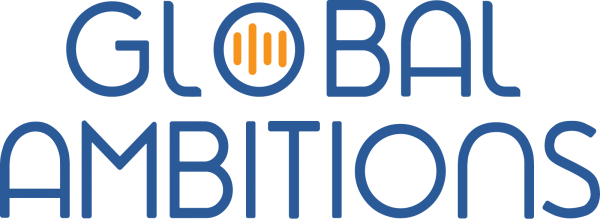With Simon Lesser, Co-founder and CEO of Dragon Metrics
Below is a full transcript of this episode
Stephanie Harris
Hi, my name is Stephanie Harris, and I’ll be your host today for this episode of Global Ambitions. Our guest today is Simon Lesser, and he’s the co-founder and CEO of Dragon Metrics. And our topic today is International SEO Challenges and Solutions. So, Simon, welcome to the program.
Simon Lesser
Thanks.
Stephanie Harris
So can you, first of all, tell us a little bit about yourself and maybe even Dragon Metrics? What do you guys do?
Simon Lesser
Yeah, sure. So Dragon Metrics is an all-in-one SEO software platform, and that just kind of means it has a big collection of tools, kind of a Swiss army knife of everything that you would need to be successful in organic search. And so, Dragon Metrics is kind of designed for the needs of global marketers at its core.
So for me, I’ve been working in SEO all the way since back in 2007. I came from it, I guess, from the technical side. So I’ve always been interested in software and programming my whole life. But I didn’t study at university. So my first job out of school, I tried interviewing at a web design firm as a programmer, and they said, Yeah, you’re not really qualified for this, but we actually really like you. We want to still hire you, but we don’t know what we’re going to do with you yet. We’re going to find something for you. The thing that they found for me was this new thing at the time called SEO.
And so I kind of became their SEO guy. And so I did that for a couple of years at a web development agency. Then I moved back to China. I lived there for a little bit in the past, tried learning Mandarin Chinese. I can’t tell you why I wanted to learn it. I just studied abroad there and I just thought it was the coolest language ever. But, you know, you really just have to immerse yourself. So I went back this time to do it legit. So I studied Tsinghua University to learn Mandarin, and then ended up in Hong Kong working at an SEO agency that helps big enterprise companies get into Asia Pacific.
And it was working for that agency… You know, we were trying to help these companies in countries like China and South Korea where Google was not predominant. And there were no tools that would support that. You know, there was a couple of tools for Google at the time. And so we just had to build our own, basically, and it kept getting bigger and bigger. And then Richard Mabey, the managing director of The Egg Company, and I just kind of spun out the software and that became Dragon Metrics. And we started selling and it’s been going strong ever since.
So from its very core, it was like, yeah, we got to support Google globally, you know, because Google is still big in most countries. But in every place like China, South Korea, with Baidu and Naver, we support those as well.
Stephanie Harris
Well, I imagine that’s a pretty big challenge with all the different search engines upgrading algorithms all the time. So I guess the question would be when you have clients who are coming to you, first of all, if they maybe haven’t really dived into these different international search engines, things like that, and they’re looking for search engine tools that go across the languages, what are kind of the first key things that you would tell them as they’re beginning this search?
Simon Lesser
Sure. Yeah. So there’s no shortage of SEO tools on the market. I think on G2.com, I think I saw there are over 200 different SEO tools. Oh my. Goodness. So a lot of them are really just kind of very Western language-focused or exclusively Google only, but there are some that support other search engines too. But you know, they say that, oh, they support rank tracking on Baidu or something like that, but they don’t really do full support. So, really there’s no other tool in the market that, you know, you want a tool that can do search volumes and support SERP features because that changes the whole landscape of what this looks like and has a good database. So you want to look at the tool size of their database for keyword research in all these different countries, not just your English speaking markets and stuff like that.
Stephanie Harris
Right. Okay. So what are some of the biggest challenges that you see clients facing as they’re jumping into this next stage?
Simon Lesser
Yeah. So I would say international SEO is quite a challenge because you have all the normal challenges that you have with just a domestic scale, I guess you would call it. Which is enough for most organizations. That will definitely keep you busy. And most organizations have trouble with that on its own. But then you have a whole other set of challenges as well. They’re kind of piling on top of it. So that’s the first thing.
But I think one of the biggest challenges that we see is that the home country site or the main site is ranking well. But all the other international sites are not ranking nearly as well. And there’s a lot of reasons for that. And it makes perfect sense why. When it comes down to it, it’s just the effort that they put into their main site and then compare that to the effort for each individual international site. It’s just not the same. So, you know, they spend a ton of time on the main site and then they just translate all the others and they expect to rank well. And that’s just not how it works.
You know, I think a good way… I’m not really a sports guy, but a good way to think about it is for your international sites. You don’t have the home-court advantage. You’re playing on somebody else’s turf. If somebody else is putting all of their efforts, if they’re, you know, headquartered in that country, they’re putting all their effort or the vast majority of the effort in that country. If you’re just spending 5% of your time there, then it’s no surprise that you’re not ranking well there. Yeah. So that’s one challenge that we see.
Let’s say that you’re lucky enough or you’re hardworking enough that you do start ranking well globally. Another big problem that we see is international cannibalization. And what that means is that the wrong content is ranking in the wrong country.
Stephanie Harris
Huh. Interesting.
Simon Lesser
Yeah. So the most typical version of that is your UK site is ranking above your U.S. site or vice versa. You know, if I’m in the U.K. and I search for a keyword and our site comes up, but it’s the U.S. version of the site which the content maybe is not targeted for or supports different products and services, or it’s just the wrong place. It’s nice that you’re ranking number one, but it’s the wrong site. And that one comes down to the former issue, which is your international sites are competing against each other, I guess. And the one with the launch authority or that’s optimized better, you know, might outrank it. So that’s that’s another issue that we have.
Stephanie Harris
Yeah, I know that that’s something… the idea of having your initial content for those sites being really more tailored and specific is something that we see a lot. It used to be much more the, you know, oh, we want to have sites in these countries, let’s just translate versus now we’re seeing a lot more, “Okay, let’s do the research. Let’s copyright stuff specifically for these markets.” And that’s, I think, a growing trend, which is good to see.
Simon Lesser
Exactly. And, you know, that’s exactly, I think one of the other biggest challenges that I see is with localization and just the concept of getting it through people’s heads that localization is not the same as translation. Yeah, translation is a prerequisite, but it’s so much more than that.
You know, one of my favorite examples is I show people, you know, I’m like, “Have you ever seen the top ten most popular sites in China?” I show them to people, you know, it’s just like, I don’t know if you’ve ever seen it. It’s just this huge wall of text and everything’s a link and they’re like, Oh my gosh, that’s the ugliest thing I’ve ever seen. And we’re like, Yeah, these sites people love them in China. Like, that’s just the different design philosophy too. You can’t just roll out the same design. Yes, you know, culture and currency and money and all these other things. But also even design, people are going to have different design preferences throughout the world. So even using the same template may not even work.
Stephanie Harris
Yeah, I noticed that when I was living in… I lived in Japan for a number of years and the same thing happened for all of the websites. I had such a hard time navigating, but they were so popular in Japan. They like that certain style.
Simon Lesser
Right? You’re like, this user experience is terrible, but they might be thinking like, Oh, that’s it’s great. This one’s for us.
Stephanie Harris
Yeah, that’s super interesting. So do you have any examples of things that you can point out where, oh, this was done incorrectly, and it really affected them, or any of the sort of tricks and tips that can help people to avoid these mistakes that really reduce people’s rankings?
Simon Lesser
Yeah, I think one of the most egregious problems that, you know, I’m still surprised that we still see it in 2022 is we see a lot of sites still doing geo-specific redirects. And what that is, is when you visit the site, they kind of do a reverse IP address look up and they say, okay, you’re coming from this country. We’re going to send you to this country’s website. And from a user experience perspective, that may not be what people want, but from a SEO perspective, it’s oftentimes a complete disaster.
Because what happens is Google, and really most search engines, they crawl from one place. So Google crawls from California and nowhere else. And so if you’re looking up, where is this person coming from and redirecting them to that site, that means that they’re all going to be from California if it’s Google. And none of your international sites are even going to get indexed. And so that can be a really big problem.
It’s common issue in, like, I guess like, where legal gets involved in, like health care or different laws for different places or pharmaceuticals, say like, “oh, well, we are not allowed… legal says we’re not allowed for people from this country to access this content,” right, that kind of thing. And so you’ve got this kind of internal battle.
You know, really, the best way to do that is an interstitial that says… you know, nobody loves a big modal that pops up. That says, “Hey, we can see that you’re coming from this country. You might want to go to this site instead.” You know, I understand why people don’t want to do that, but really, it’s very important. So if you have to have a redirect in there, you just lose that fight with the legal department.
And what you need to make sure to do is retract the homepage. Right . But make sure that they have a way to get back and just don’t do a blanket redirect so that if you say like, no, I really do want to go over here, that you actually can and it’s not just going to keep kicking you back to the regional site. Because you need to think about it from a crawlers perspective. Can the crawler get to those pages, too?
Stephanie Harris
Right. Right. Okay. Here’s maybe a tangential question off of that. So when someone’s setting up their website architecture, what do you see as the most advantageous for international SEO? Is it having subdomains? Is it having a domain for each of the sites with the, you know, dot JN for Japan? Do you have any recommendations around that?
Simon Lesser
Sure. Yeah. It’s kind of the age-old, you know, biggest debates in the SEO. Yeah. Subdomains versus subfolders, especially for international properties. I’m a big believer in keeping everything on the same root domain and using different subfolders for each. The main reason there is to kind of consolidate the authority of the root domain.
Now, Google says that there’s no such thing as domain-wide authority and that we treat every URL individually. But. We don’t really know, but most of us don’t really believe that because the evidence suggests otherwise. And so if you’ve got a completely different, top level domain, you know, a .co.uk versus a .com versus a .fr, you know, those are completely separate and even a subdomain of the same root domain. In theory, those could be completely separate sites. Look at like blogging sites that have subdomains for each different user.
Stephanie Harris
Mm hmm.
Simon Lesser
So if you put everything in a different subfolder, you can kind of consolidate that authority, especially when you’re talking about backlinks, because that’s one of the biggest issues that we see too. Is that people get all these backlinks for their main site and then their international properties have one backlink or two, very few local backlinks. And again, you need local backlinks from each country for that too. So kind of consolidating under one root domain, just having subfolders helps with that issue for sure as well.
Stephanie Harris
Thank you for weighing in on the age-old debate.
Simon Lesser
Sure.
Stephanie Harris
So to close this off, do you have any other advice around the topic of international SEO?
Simon Lesser
Yeah, I would say that what’s key to making sure that your international sites rank well is to you know, what I mentioned earlier is kind of giving your international sites equal love and that comes in a lot of ways. That comes in you know, making sure you’re getting local backlinks and things like that. But it’s also about your teams. You know, what I’ve seen a lot of times is that …we’re kind of talking about big enterprises for a for a moment here, that big enterprise will have a great SEO team at their global headquarters, and then they’ll either have just general marketers kind of fill that role at each one of their offices that are international offices. Or just somebody who’s very, very junior.
Stephanie Harris
Mm hmm.
Simon Lesser
And consolidating that skill, knowledge and talent is not necessarily a great way to do it either. And it really helps having that local expertise and the local knowledge there. Mm hmm. So it all comes down to to that, you know, to making sure that that’s all set up and having SEO and localization involved as early in the process as possible. You know, we always say that SEOs should be involved when you start talking about a redesign from that level, but also localization too. And those things go completely hand in hand together. And if you don’t have local support in each one of these countries, there are going to be things left behind.
And things like hreflang we see is now more important than ever. Hreflang is just a way to tell Google, hey, this URLs is in this language, but there are all these other versions available. Google recently removed the tool in Google search console that lets you tell Google which country you’re targeting. That’s completely gone. So now we’re fully reliant on hreflang.
At Dragon Metrics. We check for 13 different IT hreflang issues when we crawl your site, and we kind of look for what’s wrong. We give advice on how to fix it. We have never, in the how many years we’ve been supporting this, we have never had a single site pass all of that. Every site has at least, you know, let’s say at least one, but usually at least a few hundred. If hrefling issues. It is incredibly complicated to implement. Even the best sites, the best SEOs. Nobody’s doing it perfectly right.
And Google is going to tailor their rules around that to understand that it’s not right half the time. So they’re not always going to going to go along with it, but it shows evidence. It needs to be involved from the very beginning, from the beginning of the strategy.
Stephanie Harris
Right. Right. Well, thank you so much, Simon, for coming on and giving your insights into this topic. It’s super interesting. And we’ve just been hearing more and more about it recently, so it’s great to have this opportunity to have you on.
Simon Lesser
Yeah, thanks for having me.

Simon Lesser
Co-founder and CEO of Dragon Metrics




